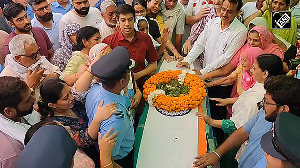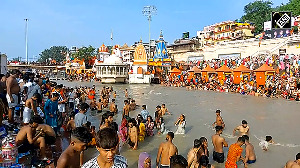'The man stood alone, fought alone.'
'Some of those battles appeared Quixotic at times.'
'Ultimately, it was he who won though it may have seemed as if a Sancho Panza was fighting a relentless battle against the windmill.'
N Sathiya Moorthy salutes the fearless editor who has passed into the ages.

They were friends from a young age, a dignified brother-sister kind of relationship that they maintained till the end.
Both had their share of health issues over the past years, yet none would have thought that veteran journalist and thinker 'Cho' S Ramaswamy, would breathe his last only a day after Tamil Nadu Chief Minister J Jayalalithaa's death.
From time to time, the local media had claimed that Cho was Jayalalithaa's political advisor and guide.
There used to be reports, especially during the days of the Bharatiya Janata Party-led Vajpayee government and earlier when the Janata Party was taking shape and was in power, that Cho had great influence over at least a section of the ruling class in distant Delhi.
Yet, the man stood alone, fought alone. Some of those battles appeared Quixotic at times.
Ultimately, it was he who won though in the interim it may have seemed as if a Sancho Panza was fighting a relentless battle against the windmill.
Without doubt, Cho would have been what he was without his personal connections and linkages with the political class, be it in Chennai or in Delhi or elsewhere.
Contrarily, possibly he might have ended up losing a part of his elan and conviction by having to defend the indefensible in some cases, and not praising the unpraiseworthy actions of his politician-friends -- those that went beyond being mere acquaintances, good for a meaningful evening of purposeful exchange of ideas and views.
Cho would have remained what he was even without his later-day identification with individual politicians and their ideologies.
He had gained enough fame of his own, and to that extent a following, after his satirical political plays hit it off with the middle-class urban audience of the Tamil Nadu of the 1960s and 1970s in particular.
It meant that his plays would have something new to say, and in a jovial but unhurting manner, every evening -- based on the day's news reports.
In turn, this brought him a 'repeat' audience, who devoured all the strong anti-establishment criticisms delivered with an overdose of wit and wisdom, both relished and cherished to this day.
It was thus that the most famous of his plays, Mohammed bin Tughlaq, a master-satire that improvised upon the day's political and administrative events, drew huge crowds every evening, wherever staged, inside and outside Tamil Nadu, wherever spoken Tamil was understood and appreciated.
The play was about an archaeologist 'discovering' the 14th century sultan of Delhi known for his controversial decisions from an unmarked grave, but alive.
The rest of the play is about how people and political leaders allow themselves to be fooled by the man showing up as Tughlaq, if only to sub-serve their own ambitions, until the latter subsumes he who was a revolutionary youth wanting to 'educate' the people about their own foolhardiness and the avarice of their existing leaders.
The more embarrassing the plays of Cho's Viveka Fine Arts troupe -- named after Chennai's Vivekananda College, the common link for most of its members -- more popular did Cho become.
His genre of play-writing was unknown before his times, a vacuum that he may not have noticed existed before experimenting with it, if only to give expression to the frustrations of the youth, to which generation he and other troupe members had belonged.
The growing popularity and the ever-changing times meant that Cho needed a wider medium than plays in which troupe members could participate only during weekends, as they were all amateurs with daily professional commitments to make a living.
Cho himself was a law graduate, working as a legal advisor to the TTK Group at the time.
Thus was born Thuglak, the magazine, in which the editor extended the pleasure of satirical criticism of the other, to include the self.
It was again an experiment turned experience, filling a vacuum in Tamil journalism (rather Indian language journalism), without any market surveys and 'positioning' of the product.
Thuglak the magazine became as popular as Tughlaq the play, and the hired printing presses could not cope up with the print orders increasing by the hour.
Yet, Thuglak was also a sedate looking magazine, where there were no eye-catching pictures or tantalising filmi bits.
Thus, when Cho wrote a serialised story in Thuglak on the travails of an upcoming Tamil film producer, his fan club only expanded -- without his having to make any compromises in the quality of his writing, by retaining only the wit and humour that came naturally to him.
His ongoing innings as a popular Tamil film comedian with his personalised satirical touch, and an occasional script writer also helped him understand what he was writing about.
Yet, Cho made a greater name for himself, exposing the unquestioned behaviour of the Indian masses -- the 'herd mentality', as he often exposed -- in his serialised novel, placed in the Independence movement, about a typical student revolutionary of those days.
It was not about the story, but about a Sanskrit shloka that went at the top of the week's story through the serial's lifetime. The shloka claimed to be from Kautilya's Arthasastra, and its meaning, given in Tamil, would fit the narrative of the week's story.
More than the story, it was Cho's choice of the shloka that was acclaimed by readers, through their numerous letters to the editor, at personal meetings and even at public events.
Some of those praising Cho were leading personalities from different walks of life, politics and the civil services.
It was not until the series ended and Cho declared that the shlokas purported to be from the Arthasastra did not exist in the first place, and what he had produced was a summary of the week's story, written down in shloka form by a Sanskrit scholar, did his readers realised how foolhardy they had been to take everything that came from someone they trusted and wanted to trust.
It was also the message that Cho had wanted to convey -- and it got conveyed in his own inimitable way.
All of it also meant that Cho should have his own share of political problems.
Ahead of the 1971 general election, in which he opposed the Indira Gandhi regime at the Centre and the ruling Dravida Munnetra Kazhagam electoral partner in Tamil Nadu, tooth and nail, but on issues, not on personalities.
Trouble came in the way of cinema owners pulling out the filmi form of Mohammed bin Thuglaq, a forerunner to the genre of Kissa Kursi Ka in Hindi.
Yet, the issues that Thuglak highlighted at the time boosted its circulation in ways that his critics and adversaries would not have anticipated.
Thus, ahead of the 1971 election, the magazine published vulgarised pictures of Hindu gods carried in a 'rationalist' Dravidar Kazhagam procession in Erode, the home town of social reformer and ideologue 'Periyar' E V Ramaswami Naicker.
M Karunanidhi's DMK government did nothing about the participants in the procession and Thuglak's near exclusive pictures in an era without social media, that too days after the event, when the daily newspapers of the times had maintained a silence, stood for Cho's courage and more so for his courage of conviction.
Whether or not all these episodes made him a stronger proponent of Hindu ideology, though not necessarily Hindutva ideology per se, Cho began reading and writing about various Hindu scriptures in great interpretative detail, to greater acclaim of his loyal readers and scholars.
There also came a time when Cho began openly backing the BJP's prime ministerial candidate Narendra Modi over the legitimate claims of his closer friend L K Advani.
His inherent criticism of the Congress and the dynastic rule that he identified the party with, and all that had gone wrong with the nation, which like many others he also believed, under decades of Congress rule, kept finding new pastures for support and sympathy, at times illogical and over extended.
During the Emergency and afterwards, he would support the Janata Party formation and would lament its subsequent collapse.
Through the Emergency, he had the courage to leave 'censored' portions of Thuglaq blackened out, without being plaint and submissive -- a rare quality that newspaper establishments, barring a handful, failed to display.
The courage went a little farther when he launched an English magazine to take on the Emergency rulers, but Pickwick did not take off.
It was too early for its times and much of the content seemed to have been thought of in Tamil and written in English.
To Cho, 'balanced journalism' did not mean equitable magazine space for all political players he was writing about.
He was convinced that it only meant that supporting the just, though 'just' in this case came in relative terms.
For all this, however, Cho was not without his share of fault lines.
His initiatal appreciation of political leaders often began with a personal relationship and assessment, going beyond the policies and performance in government.
It was thus that to him up to a point, Jayalalithaa could do no wrong -- or, at least, she could not be as wrongful as Karunanidhi.
It was MGR to him, before Jayalalalithaa.
It was so with the likes of Morarji Desai, Chandra Sekhar, L K Advani and Narendra Modi.
While not holding back on his praise for those that he admired and supported in politics at a personal level, Cho did not stop from criticising their government's policies from time to time, again in his inimitable style.
It also meant that his interpretation of political situations and support for causes derived more from sympathy and empathy for personalities.
So did his criticism on issues, up to a point and often after a point.
Yet, he maintained good and cordial relations with one and all and earned the praise and respect of even his worst critics, starting with Karunanidhi.
GenX may not have known him as much, yet in his time, Cho set the standards for impartial journalism, and more so for investigative journalism -- which has remained the hallmark of Thuglak magazine even when failing health kept him away from its columns intermittently.
His supporters, sympathisers and followers could well cherish his memory through those columns, which may not be the same as it was when Cho was around, yet continue to innovate and readjust itself to the changing face of Tamil journalism, but without compromising on the basics.
N Sathiya Moorthy, veteran journalist and political analyst, is Director of the Observer Research Foundation, Chennai Chapter.











